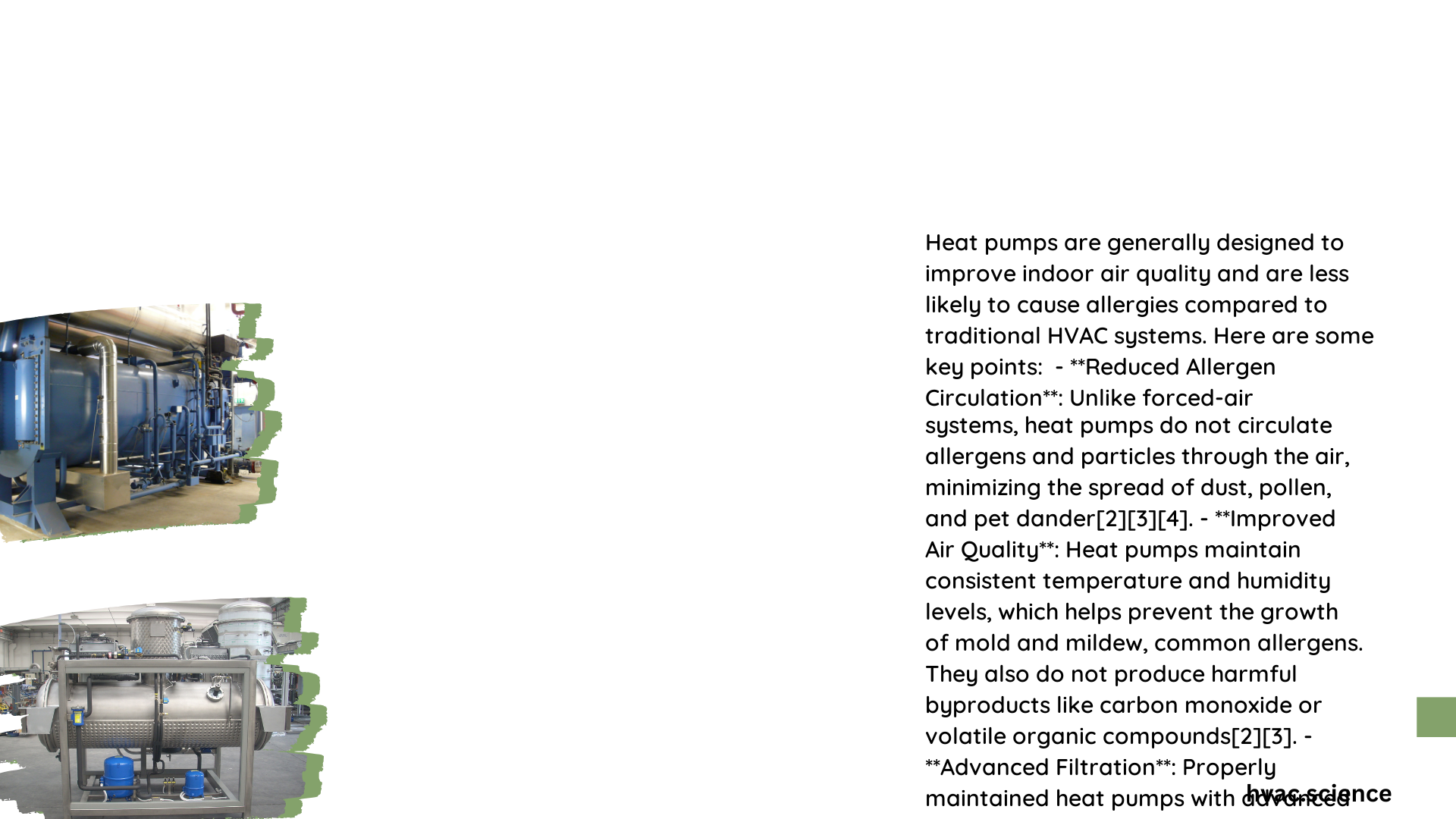Heat pumps are generally beneficial for indoor air quality, but improper maintenance can lead to allergy issues. While these systems typically filter out allergens like dust, pollen, and mold spores, neglected heat pumps may circulate these particles, potentially causing or exacerbating allergies. Regular maintenance, including filter replacement and professional servicing, is crucial to ensure heat pumps continue to improve air quality rather than contribute to allergy problems.
Can Heat Pumps Directly Cause Allergies?
Heat pumps themselves do not directly cause allergies. However, if not properly maintained, they can contribute to allergy symptoms by circulating allergens throughout your home. Here’s how this can happen:
- Accumulation of allergens: Over time, dust, pollen, pet dander, and other allergens can build up in the heat pump’s filters and ductwork.
- Circulation of particles: When the heat pump operates, it can blow these accumulated allergens back into your living spaces.
- Moisture issues: Improperly maintained heat pumps may not effectively control humidity, potentially leading to mold growth.
What Are the Common Allergy Symptoms Associated with Poorly Maintained Heat Pumps?

When a heat pump is not properly maintained and begins circulating allergens, it can lead to various allergy symptoms:
- Sneezing
- Runny or stuffy nose
- Itchy or watery eyes
- Coughing
- Wheezing
- Skin rashes
- Headaches
- Fatigue
These symptoms can be particularly problematic for individuals with pre-existing allergies or respiratory conditions like asthma.
How Does Heat Pump Maintenance Affect Allergy Symptoms?
Proper maintenance of your heat pump is crucial in preventing allergy symptoms. Here’s a breakdown of how maintenance affects allergy potential:
| Maintenance Action | Effect on Allergies |
|---|---|
| Regular filter cleaning/replacement | Reduces allergen circulation |
| Annual professional servicing | Ensures optimal performance and air quality |
| Duct cleaning | Removes accumulated allergens from the system |
| Humidity control check | Prevents mold growth and related allergies |
By following a consistent maintenance schedule, you can significantly reduce the risk of your heat pump contributing to allergy symptoms.
What Are the Best Practices for Maintaining a Heat Pump to Prevent Allergies?
To keep your heat pump from causing or exacerbating allergies, follow these best practices:
- Replace filters regularly: Change or clean filters every 1-3 months, depending on usage and environmental factors.
- Schedule annual maintenance: Have a professional HVAC technician inspect and service your heat pump annually.
- Keep the outdoor unit clean: Remove debris, leaves, and dirt from around the outdoor unit to prevent them from entering the system.
- Monitor indoor humidity: Maintain indoor humidity levels between 30-50% to discourage mold growth.
- Use high-efficiency filters: Consider upgrading to HEPA filters or other high-efficiency options to capture more allergens.
- Clean vents and registers: Regularly dust and vacuum vents and registers to prevent allergen buildup.
How Can You Improve Indoor Air Quality When Using a Heat Pump?
In addition to proper maintenance, you can take several steps to improve indoor air quality when using a heat pump:
- Ventilate regularly: Open windows when weather permits to allow fresh air circulation.
- Use air purifiers: Supplement your heat pump with standalone air purifiers in high-use areas.
- Control indoor pollutants: Minimize the use of chemical cleaners, air fresheners, and other potential irritants.
- Maintain a clean home: Regular vacuuming, dusting, and washing of bedding can reduce overall allergen levels.
- Monitor outdoor air quality: On days with high pollen counts or poor air quality, keep windows closed and rely on your well-maintained heat pump for filtration.
What Are the Long-term Health Implications of Exposure to Allergens from a Poorly Maintained Heat Pump?
Prolonged exposure to allergens circulated by a poorly maintained heat pump can lead to several long-term health issues:
- Chronic respiratory problems: Persistent exposure to allergens can worsen asthma and lead to chronic bronchitis or other respiratory conditions.
- Weakened immune system: Constant allergic reactions can strain the immune system, making you more susceptible to other illnesses.
- Sleep disturbances: Allergy symptoms can interfere with sleep quality, leading to fatigue and decreased overall health.
- Reduced quality of life: Chronic allergy symptoms can impact daily activities, work performance, and general well-being.
When Should You Consult a Professional About Heat Pump-Related Allergies?
If you suspect your heat pump is contributing to allergy symptoms, consider consulting a professional in the following situations:
- Persistent symptoms: Allergy symptoms that don’t improve with regular cleaning and maintenance.
- Visible mold: Any signs of mold growth in or around your heat pump system.
- Unusual odors: Strange smells coming from your vents when the heat pump is running.
- Decreased efficiency: If your heat pump seems to be working harder than usual to maintain temperature.
- After water damage: If your home has experienced flooding or significant water damage.
A professional HVAC technician can perform a thorough inspection and cleaning of your system, while an allergist can help determine if your symptoms are indeed related to your heat pump or have another cause.
By understanding the potential for heat pumps to affect allergies and taking proactive steps in maintenance and air quality control, you can ensure that your heat pump contributes positively to your indoor environment rather than causing allergy issues.
References:
1. https://electrichomes.co.uk/knowledge-hub/can-heat-pumps-improve-indoor-air-quality-and-national-health/
2. https://apexcleanair.com/how-a-new-heat-pump-improves-your-indoor-air-quality/
3. https://www.nibe.eu/en-gb/homeowners/start-your-heat-pump-journey/understanding-heat-pumps/how-heat-pumps-can-boost-indoor-air-quality
